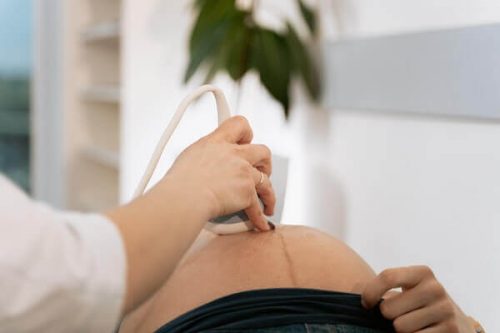It is very common for women to reach adulthood already knowing the most characteristic signs and symptoms of early pregnancy1. Women who are trying to conceive often not only know about these symptoms but are also always on the lookout to see if they show up during their next cycle. But did you know that some symptoms can appear as early as the first days of pregnancy?
The first pregnancy symptoms can show up even before a woman suspects she might be pregnant. In most cases, only those who are already trying to conceive and are monitoring their cycle—using something like basal temperature or simply by knowing their menstrual cycle—will notice these symptoms in the earliest days of pregnancy.
In the first days of pregnancy, symptoms can be very subtle and go completely unnoticed by pregnant women. In addition, since all pregnancy symptoms are caused by hormones, they can initially be confused with PMS symptoms2 that are typical during menstruation.

However, pregnancy and PMS have very different symptoms: PMS does not include nausea, vomiting, or aversion to smells. In addition to menstrual cramps, PMS is marked by irritability, cravings for sweets, mood swings, tension, and headaches.
The first days of pregnancy are marked by a crucial event: implantation3, which is the embedding of the embryo (the egg fertilized by the sperm) into the uterus after intercourse. At this stage, implantation bleeding can occur, which may be mistaken for the start of a period, but is actually one of the first signs of pregnancy.
Although rare—it happens in only 20% of women—pregnancy suspicion can be strengthened by spotting a tiny dot of blood in your underwear. This happens because of the embryo attaching and the shedding of the endometrium, which lines the uterine wall. Remember, this type of bleeding does not have flow and lasts only a very short time.
At this stage, some women may also notice changes in taste, smell, and breast sensitivity, along with fatigue and drowsiness. The breasts can also become more pronounced or develop little bumps around the nipples, for example. All this is caused by increasing hormone levels, which make the mammary glands more sensitive.
In the first days of pregnancy, body temperature can also change. Usually, the pregnant woman feels hotter, especially in the face, hands, and feet. Some even have a slightly feverish temperature at the beginning of pregnancy due to an increase in progesterone, produced by the body and induced by the corpus luteum.
There are also reports of pregnant women who, during the initial period, felt shortness of breath as a result of increased blood pressure and heart rate, and others who, along with these signs, also experienced constipation, tiredness, mood changes, and even irregular bowel movements as a sign of pregnancy.
Of course, pregnancy symptoms vary from woman to woman. Each pregnancy is unique and has its own characteristics. In the end, only a pregnancy test and a medical exam can confirm whether your dream will finally come true!
Other Early Pregnancy Symptoms
Other pregnancy signs that can occur are cramps very similar to period pain or lower abdominal pain. This explains why many women feel bloated and find their pants a bit tighter. Another symptom is more frequent urination, which happens because of the pressure the uterus puts on the bladder.
This gives a constant urge to pee, even before a missed period. Some women also experience, as early symptoms of pregnancy, an increase or appearance of pimples. These pimples are hormonal, as are dizzy spells due to more progesterone, or the famous mood swings of a newly pregnant woman.
Tearing up even at a margarine commercial? Or at a song that brings back memories? Pregnant women really do become emotional from the very first days of pregnancy!
IMPORTANT: Early pregnancy symptoms show up differently for each woman and each pregnancy, so it’s good to pay attention to your body’s signals to spot the signs.
When Should I Take a Pregnancy Test?
The ideal time to take a pregnancy test is after a missed period—that is, you need to wait for the expected date of your next period to be able to confirm. But if you’re trying to conceive, it’s very difficult to hold back your anxiety and wait for a missed period to take the test.
However, this wait is necessary to allow the pregnancy hormone HCG to rise during the gestational phase. As that hormone increases, pregnancy symptoms become more evident and the test becomes more reliable.
These days, 10 mIU tests are the most sought after, so I recommend Famivita’s for you. With it, it’s even possible to detect pregnancy up to 3 days before a missed period. You can find Famivita’s test here.
Thanks to its high sensitivity to the HCG hormone, the drugstore test is totally reliable, giving the correct result up to 2 days before a missed period, just like the pregnancy test from Famivita.
When to Have the First Ultrasound?
Usually, in the first days of pregnancy nothing shows up on ultrasound even if you get a positive result. You have to wait at least until the 5th or 6th week for the gestational sac or baby to start showing on an ultrasound done by your doctor.
It’s very common for women with a positive beta HCG, but with a relatively low value (<1000, or even less than 100), to have an ultrasound and see nothing but a thickened endometrium and, sometimes, a corpus luteum (functional cyst).
That’s when worry often sets in and women start thinking of sad possibilities like blighted ovum, ectopic pregnancy, or even a missed miscarriage. That’s why ultrasound should only be done after 5 or 6 weeks. It is not recommended to do an ultrasound in the earliest days of pregnancy, unless there is suspicious bleeding.

Headaches and stomachaches can also come up in the first days of pregnancy. Some women are more sensitive to the significant rise in progesterone and experience these as symptoms even before a missed period.
Finally, one of the most noticeable symptoms is missing your period on the days it should have come. So, the recommendation is to take a pregnancy test after at least five days of missed periods to check how much beta HCG is present in your blood.
If it comes back negative, repeat it a week later. That’s because the embryo can take 7 to 15 days to implant, causing a delay before the pregnancy finally shows up on tests. Still, pregnancy signs can show up early, even in the first days of gestation.
It’s important to say that early pregnancy symptoms can be confused with post-ovulatory symptoms and make a woman suspect pregnancy even when she isn’t pregnant.
To tell the difference, it’s crucial to wait for a significant missed period before doing a beta HCG test. However, if your cycle is irregular and you suspect you are in the first days of a pregnancy, you can count 20 days after intercourse and take the test.
Symptom Note from Patricia Amorim
Before my period was late, I had several of these symptoms. However, as I had a lot of experience with false pregnancy symptoms, I learned to only consider symptoms after a missed period. Early pregnancy symptoms can be confused with those of PMS and pregnancy. But there was one important symptom that always caught my attention—the increase in temperature.
During my last pregnancy, I felt very, very warm in the first days of gestation. I had the sensation of my hands and feet burning, even on very cold days. This was the symptom that made me take a test.
Frequent urination is also an important factor, but it should also only be considered after a missed period. Oh, and remember it’s very possible to have a symptom-free pregnancy. Good luck—wishing lots of positive results for all who are trying!
Readers’ Questions
How does the belly look in the first days of pregnancy?
In the first days of pregnancy, it’s hard to tell if what’s going on is actually a pregnancy. It’s common for pregnant women’s bellies to get slightly bloated, similar to premenstrual bloating. However, there’s nothing obviously different that would indicate pregnancy. This bloating happens due to increased progesterone, which causes swelling and a very slight enlargement of the uterus.
How can you recognize the first signs of pregnancy?
Not all women feel the same symptoms at first, but the most common ones are: breast tenderness, nausea, dizziness, a constant urge to urinate, fatigue, and aversion to strong smells. To recognize the first symptoms, just know your body well and pay attention to any changes or anything unusual.
What is the uterus like in the first days of pregnancy?
In the first days of pregnancy, the uterus and the whole female body start to undergo changes because of the increase in progesterone. These changes can cause abdominal pain and cramps, and that’s perfectly normal, so don’t worry.
See also: Ovulation Symptoms and Their Signs, Pregnancy Calculator, Fertile Period











